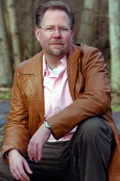Allen Braden
has received a National Endowment for the Arts fellowship, an Artist Trust fellowship, an Artist Trust grant, the Emerging Writers Prize from Witness magazine, the Grolier Poetry Prize and other honors. His work is published in The New Republic, Virginia Quarterly Review, Shenandoah, Southern Review, Georgia Review and anthologized in Best New Poets 2005, and Spreading the Word: Editors on Poetry and Family Matters: Poems of Our Families.
Former poet-in-residence for the Poetry Center and the School of the Art Institute of Chicago, he teaches at Tacoma Community College.
—Back to Poetry Contents—
|
Dorothea Lange
For her it all began on the streets of San Francisco
where The White Angel was doling out slabs of bread,
mugs of coffee and pearl barley stew. Each man’s
desperation struck her dumb with inspiration.
The studio paled at once, the light neutralized.
She could not stand it anymore, this posing
of the wealthy, this fussing over the exact placement
for a sleeve, adding a youthful gleam to their eyes,
not when she could sense the world grating upon its axis.
Perhaps it was childhood polio that allowed her to walk
unnoticed the identical, seemingly hopeless boulevards
where the unlucky sold pencils out of tin cups
or bushels of apples buffed individually with care
to catch the light in a way any artist would cherish.
She sojourned in the tent cities of San Joaquin
for the bereft imagery that creased a woman’s face,
cataloging the hundreds of pairs of hands and feet
sunburnt and scalded with each day of field labor.
She was only an invisible girl from Hoboken
but in the Shenandoah Valley during oat harvest,
with Georgia’s pickers of peaches and tobacco
or among the lives interned in California, 1942,
she was a student of the desolation around her,
how it can be endured, how it must be survived.
Walker Evans
In order to develop something akin to miracle,
he acquired a taste for the peeling billboards
that used to promise sweetness to every man
on the day and night crews at Chicago Steel.
He had an eye for the architecture of failure:
the straw broom at an angle in the immaculate
corner of a dirt-floored, single-room shack
housing a sharecropper and his family,
in front of which, at first light one day,
Evans caught four generations of reticence.
He praised the perfection in the ordinary,
in “famous men” with barefoot children
lining the edge of a tilled field outside Decatur
or in black Chryslers along an endless avenue.
From the alignment of light with shadow,
he chiseled away a new and affluent language
hidden in the columns at Belle Grove Plantation.
He spoke of how the past can shape the future
and negotiated, for us, the cracks in Alabama clay
like the Pangaea breaking into singular worlds.
Both poems originally published in Interdisciplinary Humanities
|

